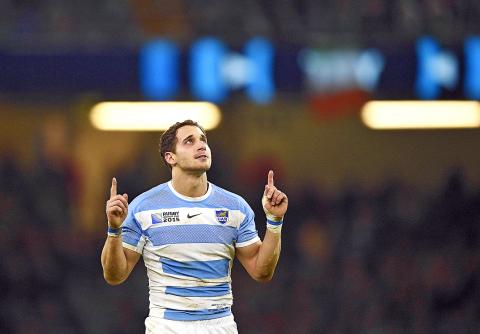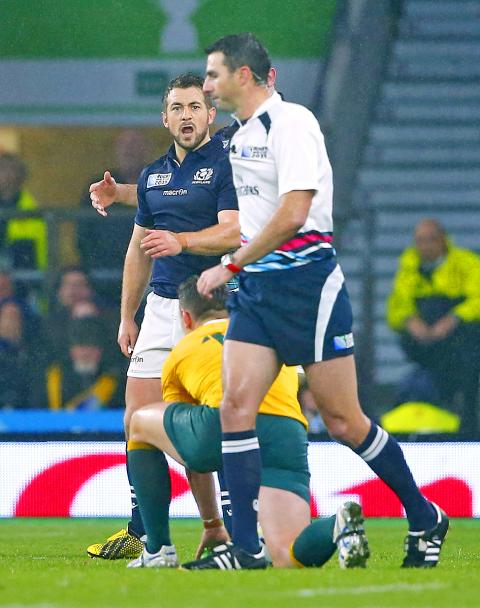Blame the weather. Blame the referee. Blame injuries.
Soul-searching — or the blame game — has begun within European rugby union after a sweep of the Rugby World Cup quarter-finals by southern hemisphere nations on the weekend. It is the first time that the northern hemisphere failed to advance at least one team to the semi-finals of the sport’s marquee event.
Sure, there were some close calls for the southern, or Rugby Championship, teams. Australia had a contentiously awarded last-minute penalty to beat Scotland 35-34 on Sunday, and South Africa — defeated by Japan on the opening weekend of the group stage in rugby’s biggest-ever upset — needed a late try to beat Wales on Saturday. However, France did not get close to New Zealand, while Argentina won comfortably over Ireland in the end.

Photo: AFP
“I think the divide is not a chasm,” Ireland coach Joe Schmidt said after his team’s 43-20 loss to the Pumas. “The margins are still fine enough.”
However, the semi-final lineup speaks for itself and shows the stark reality of where the playing power lies.
So, what has gone wrong for the northern hemisphere?

Photo: Reuters
It might seem rich for the British to complain about good weather, but the lack of rain during this World Cup has not helped northern teams. Rain and wind can be a leveler in northern versus southern hemisphere match-ups, curtailing the generally more expansive approaches of the southern teams and favoring European teams, which often revel — and are experienced in playing — in poor conditions.
The difference in conditions either side of the equator has long been viewed as an advantage for the south. Better weather, and therefore harder pitches, encourages running rugby. Players can develop a more all-round game and better handling.
This perhaps explains the poise and accuracy southern teams have in pressure moments and this was evident at crunch times in the quarter-finals. South Africa’s winning try was smart, worked brilliantly by No. 8 Duane Vermeulen and scrumhalf Fourie du Preez. The move — lining all the backs on the open-side at a set piece to attack the blind — is regularly used in junior rugby in the southern hemisphere, but somehow caught the Wales players off guard.
Australia, widely regarded as the slickest performers in the group stage, scored five tries and looked dangerous every time they entered Scotland’s quarter, but allowed Scotland to stay in the contest by conceding penalties and making mistakes while pushing passes. The winning penalty awarded to the Wallabies caused outrage in Britain.
An argument has also been raised that Europe’s national teams are not being helped enough by the club set-up in their countries. While foreigners are rare in Super Rugby teams, the number of imports arriving for a big pay-day in the lucrative French Top 14 league is reducing game time for domestic talent — not unlike the English Premier League in soccer. England’s top domestic rugby competition says an estimated 30 percent of its players are not eligible to play for England.
Outgoing France coach Philippe Saint-Andre complained about the lack of access he had to players in his four years in charge. The Welsh Rugby Union is often at odds with the nation’s regional teams.
Wales and Ireland will point to injuries hindering their chances this World Cup, but does not their physical, crash-bang approach increase the chances of injury? Southern hemisphere teams often look for space to run into — rather than at their opponent — although the France players who attempted to bring down New Zealand’s wrecking-ball winger Julian Savea on Saturday might say something different.
Here are some other things the quarter-finals exposed:
TMO SCOPE
There have been calls for Television Match Officials to have their scope expanded after the furor surrounding Australia’s late penalty against Scotland. Referee Craig Joubert was unable to ask for a television match official (TMO) review of his offside decision because referrals can only be sought for the awarding of a try or kick at goal, or assessing acts of foul play.
Those calling for TMOs to have more power have clearly forgotten the opening week, when the intrusions of TV officiating were criticized for being too often and taking too long.
NEUTRALS’ FAVORITES
Everybody loves an underdog and the biggest one left at this World Cup is Argentina. The Pumas are through to only their second semi-final at this level, and their rise over the past two decades — from a lineup based on forward grunt and 10-man rugby, to the free-flowing style of Daniel Hourcade’s current crop — has been a joy to watch.
AUSTRALIA CREAKING?
Is the intensity of being in the toughest group ever at a World Cup going to take its toll on Australia?
Having beaten England, Wales and Fiji before taking on Scotland, it is almost as if the Wallabies have played four quarter-final-standard games already. Argentina have enjoyed an easier run to the semi-finals and will like their chances against Australia.

Freddie Freeman homered and drove in four runs, Shohei Ohtani also went deep and Roki Sasaki earned his first major league win as the Los Angeles Dodgers beat the Atlanta Braves 10-3 on Saturday night for their seventh straight victory. The Dodgers have won the first two games of the series to improve to 5-0 against Atlanta this year. Los Angeles’ three-game sweep at home early in the season left the Braves 0-7. Sasaki allowed three runs and six hits over five innings. The 23-year-old right-hander gave up a home run to Ozzie Albies, but received plenty of offensive support in his

Bayern Munich on Sunday were crowned German champions for the 34th time, giving striker Harry Kane his first major trophy, after second-placed Bayer 04 Leverkusen drew 2-2 at SC Freiburg. Bayern’s 3-3 draw at RB Leipzig on Saturday, when the Bavarians came from two goals down to take the lead before conceding a stoppage-time equalizer, meant defending Bundesliga champions Leverkusen needed to win at Freiburg to delay the title party. Leverkusen were two goals down before scoring twice in the final 10 minutes, but Xabi Alonso’s side could not find a third, as Bayern reclaimed the title at the first attempt after

INTER AWAIT: Superb saves by PSG ’keeper Gianluigi Donnarumma inspired the victory, as Arsenal were punished for misses, including one by Bukayo Saka Arsenal on Wednesday fell short on the big stage again as their painful UEFA Champions League semi-final exit against Paris Saint-Germain left Mikel Arteta to rue his club’s failure to provide him with enough attacking options. Arteta’s side were unable to reach the Champions League final for the first time in 19 years as PSG clinched a tense 2-1 win at Parc des Princes. Trailing 1-0 from last week’s first leg in London, the Gunners made a blistering start to the second leg, but could not convert their chances as Gianluigi Donnarumma’s superb saves inspired PSG’s 3-1 aggregate victory. Arsenal were punished for

THRILLER: Raphinha gave Barca a 3-2 lead with two minutes remaining of regular time, but Francesco Acerbi equalized the game in the second minute of added time Davide Frattesi on Tuesday fired Inter into the UEFA Champions League final with an extra-time winner that gave the Italians a stunning 4-3 triumph over Barcelona, 7-6 on aggregate. Italy midfielder Frattesi won a tie for the ages under a downpour in Milan when he lashed home in the 99th minute, sending a packed and rocking San Siro wild with joy. Simone Inzaghi’s team will face either Arsenal or Paris Saint-Germain at the end of this month in Munich, Germany, where they would feel they have a great chance to be crowned kings of Europe for a fourth time after